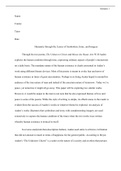Essay
Humanity through the Lenses of Symbolism, Irony, and Imagery.
- Course
- ENG103
- Institution
- Lakeland College ( )
Through his two poems, The Unknown Citizen and Musee des Beaux Arts W.H Auden explores the human condition through time, expressing ordinary aspects of people’s interactions on a daily basis. The mundane nature of the human existence is clearly presented in Auden’s work using different literary...
[Show more]




